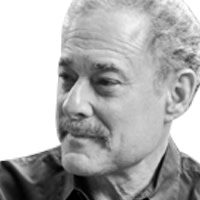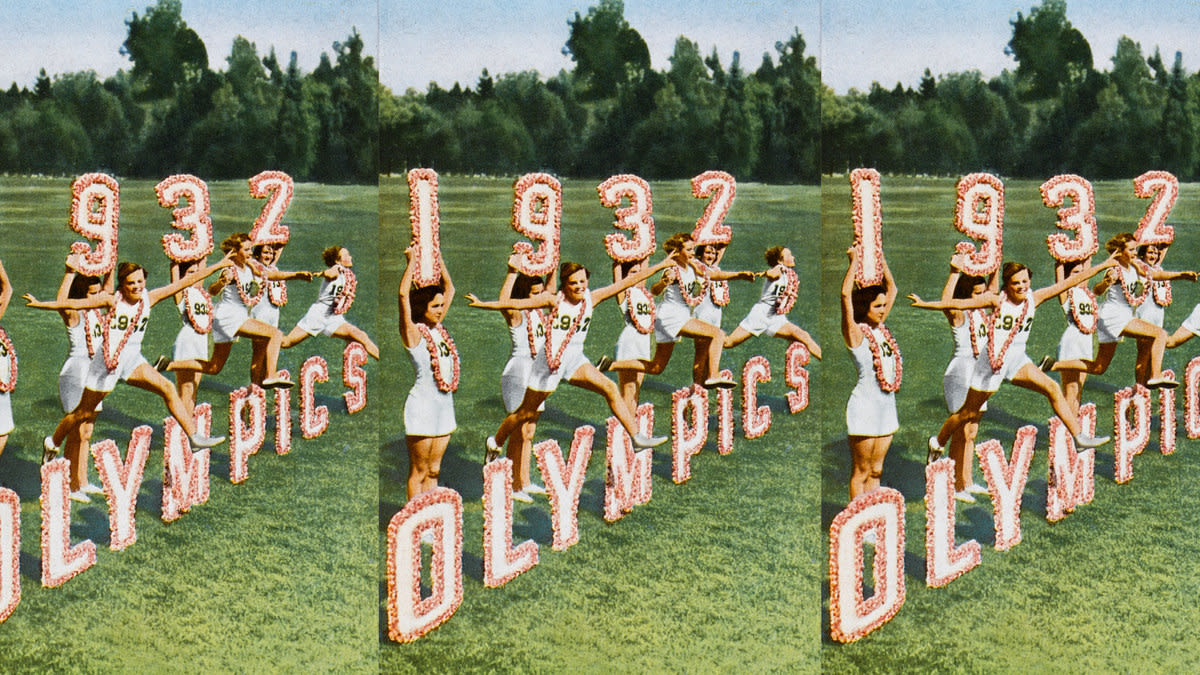What sort of city did spectators, athletes and journalists see when they arrived in Los Angeles in the summer of 1932? It was, to be sure, not the same shambling village that had bid for and won the Olympics nine years before. LA’s population had doubled, to 1,470,516, during the decade. The dusty pueblo had burgeoned into a world center for moviemaking, oil drilling, and citrus production. No fewer than six daily newspapers covered the region, all now boisterously heralding the Olympic Games.
Olympic athletes still saw plenty of open space—there were no freeways—but downtown Los Angeles looked like a bustling metropolis, jammed with noisy automobiles, streetcars and pedestrians. The city’s movie stars, including Douglas Fairbanks and Mary Pickford, lived mainly on the elevated slopes of Hollywood and Beverly Hills. The corner of Sunset and Vine was a magnet for tourists, who could dine at the nearby Brown Derby while scouting the room for celebrities.
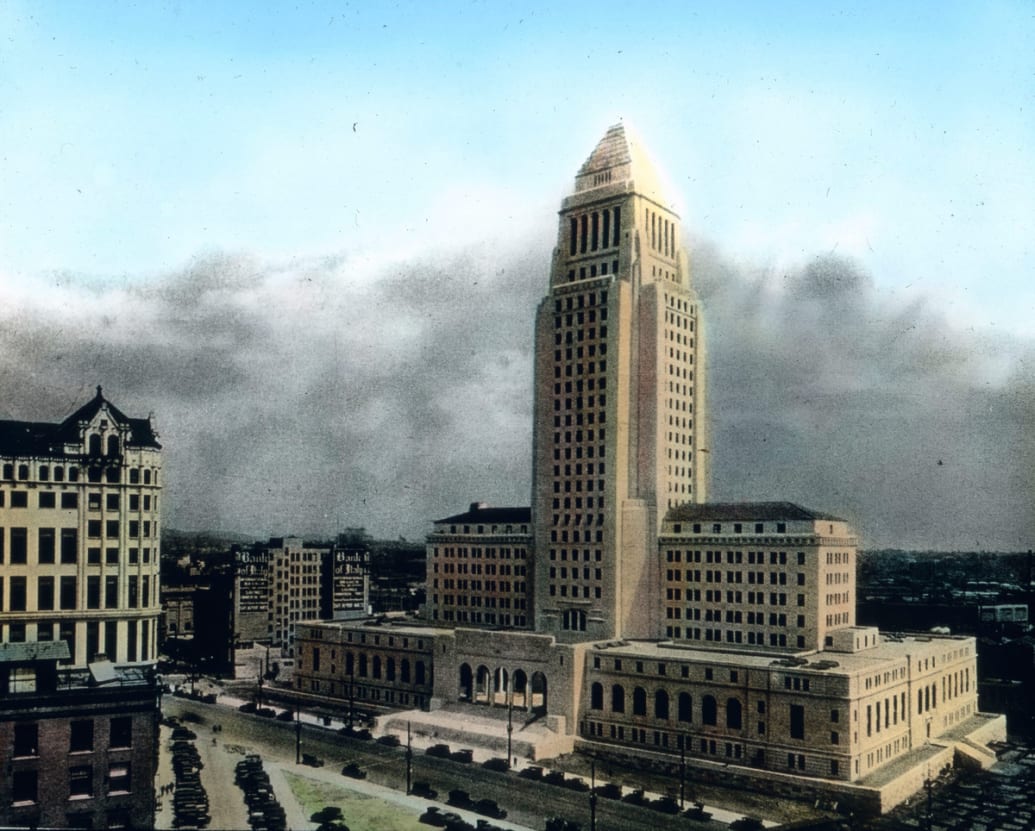
LA’s civic center boasted a lustrous new thirty-two-floor city hall, designed in part by John Parkinson, architect of the Coliseum. In Pershing Square, careworn vagabonds listened as roving evangelists shared their visions. West from there on Wilshire Boulevard, at the east end of the newly widened, art-deco-style Miracle Mile, the lush and expansive Ambassador Hotel, with its famed Cocoanut Grove nightclub, had become the hottest place in town, drawing everyone from the civic elite to Hollywood stars and—in August 1932—Olympic athletes, who didn’t mind dancing to the Grove’s big bands. (It helped that the women athletes’ Chapman Park Hotel was just a couple blocks away.) Thanks to deals cut by William May (Billy) Garland, a prominent real estate fixture in Los Angeles, known in some circles as the 'Prince of Realtors', visitors could get a good hotel room for two to three dollars a night, though an outside room with private bath at the Biltmore would set them back five to eight dollars, and one at the Ambassador would cost five to fourteen dollars. Los Angeles was vibrant, nearly boiling with Olympic excitement.
Thousands were crowding into the city. All day long, hordes swarmed the Olympic ticket counters—more than 1,500,000 tickets had now been sold, easily eclipsing sales at all previous games. Far and wide, flags of some fifty nations brightly adorned the streets. The central boulevards, with bunting hanging from every building, projected the feel of a carnival. People throughout the city were talking of nothing but the games. With so many athletes in town, it was hard not to spot some of them on the streets of LA, obvious in their dress uniforms.
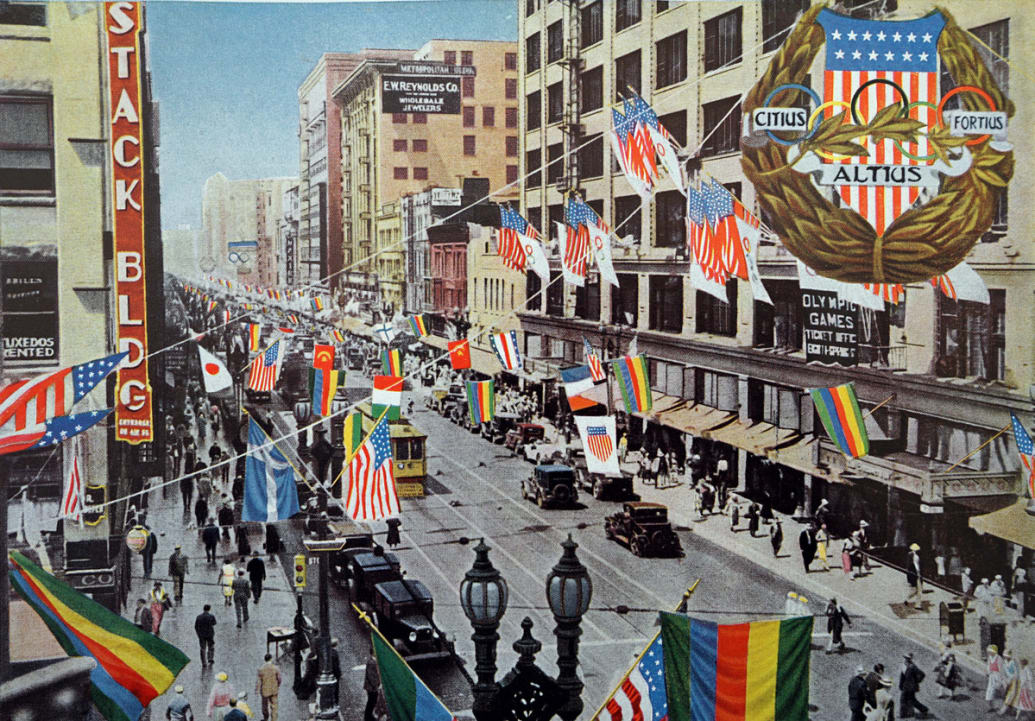
They and all the visitors to Southern California kept marveling at the organization and attention to detail provided by Los Angeles. They marveled also at the Olympic facilities, a seven-million-dollar plant, including nine stadiums and multiple venues for track, field, swimming, diving, fencing, rowing, cycling, riding, yachting, water polo, wrestling and boxing—all highlighted by the unprecedented Olympic Village (“the crowning touch . . . a stirring spectacle,” reported the New York Times) and the newly expanded 105,000-seat Coliseum. Every one of those seats promised to be occupied on the day of the Opening Ceremony. For that matter, it looked as if the entire games might sell out. Billy rejoiced, and for good reason. This stampede for tickets in the awful depths of the Depression was nothing less than phenomenal.
The scene in Los Angeles, at least before the games began, involved Hollywood’s luminaries as much as it did the Olympians. The athletes, great motion picture fans, were mesmerized by the actors. Autograph hounds, they pursued such stars as Joan Crawford, Norma Shearer, Douglas Fairbanks, Charles Chaplin, Gary Cooper, and Clara Bow (and vainly asked for Garbo). The Argentine athletes caused a tumult one day at Paramount when four of them spotted—and started chasing— Marlene Dietrich. (She had a bodyguard; they were rounded up and escorted back to the main group.) Returning the interest, movie stars often visited the Olympic Village, and Joel McCrea regularly dropped by the Chapman Park Hotel for dates with the swimmer Josephine McKim. When the American javelin thrower Malcolm Metcalf arrived at the Olympic Village and discovered his luggage was missing, none other than Will Rogers straightened it out for him. They’d “bumped into each other” as Metcalf was walking to the main office, so Metcalf told him his problem, thinking Rogers was “one of the numerous Village officials.”
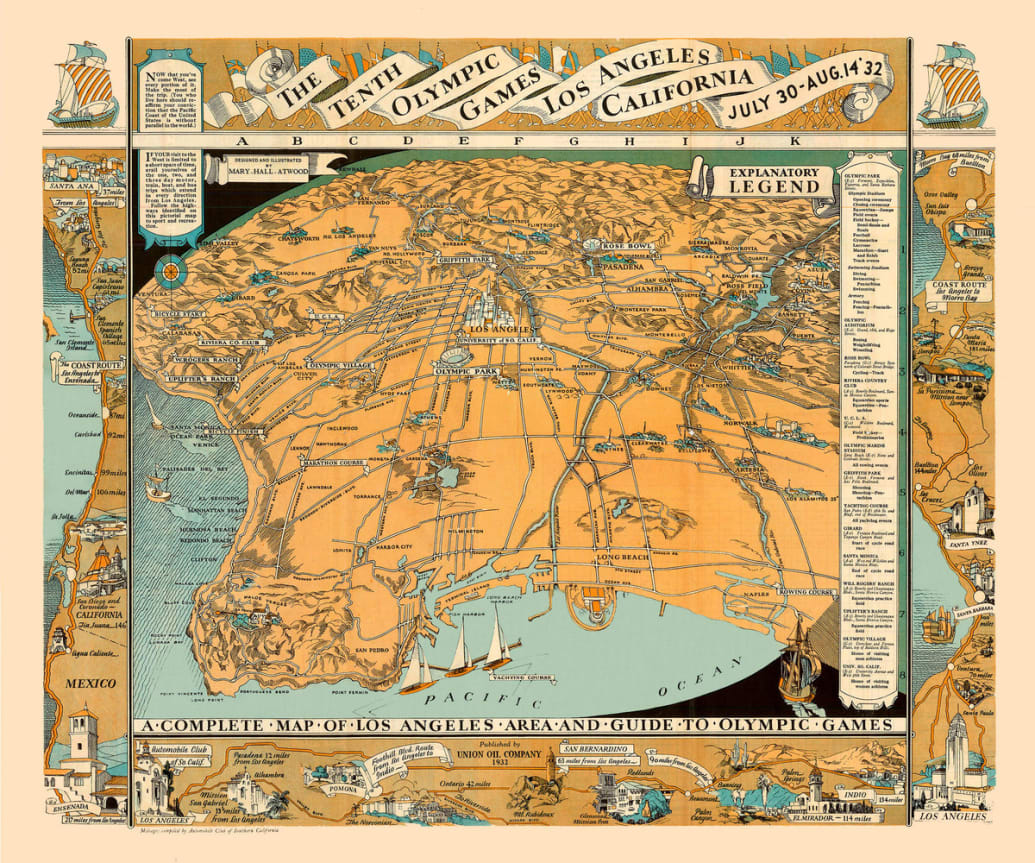
The parties and mingling with Hollywood would continue even after the games started. One day, the American relay runner Hector Dyer found himself having lunch with William Randolph Hearst in the MGM commissary, the result of Dyer’s frat buddy being good friends with Marion Davies. Jane Fauntz ended up at a swimming party where she met Groucho Marx. “Do you know what I’m going to do next year?” he joked to her. “I’m going to build a house without a pool and teach my kids not to swim.” Another day, at a Paramount Studios lunch, Fauntz marveled at Marlene Dietrich’s eyebrows, which had been shaved off and penciled on. On August 4, Billy Garland hosted a traditional dinner for IOC members at the exclusive Bolsa Chica Gun Club in Huntington Beach, a group formed by Billy and other wealthy businessmen in 1899 as a base for their duck and fowl hunting. On August 6, Louis B. Mayer (the only Jew on the California Olympiad Commission) hosted a luncheon at MGM Studios and afterward opened his studio to International Olympic Committee guests, allowing them to watch movies being made. On August 9, Douglas Fairbanks and Mary Pickford hosted a dinner for two hundred Olympic officials and foreign visitors at Pickfair, where the party included Charlie Chaplin, Clark Gable, Constance Bennett, and Marie Dressler. Chinese girls in native costumes served the meal in a large tent on the lawn that featured Oriental rugs and Chinese bunting. After dinner, the hosts screened a preview of Fairbanks’s latest movie, Mr. Robinson Crusoe, which the actor had just completed filming in the Polynesian islands.
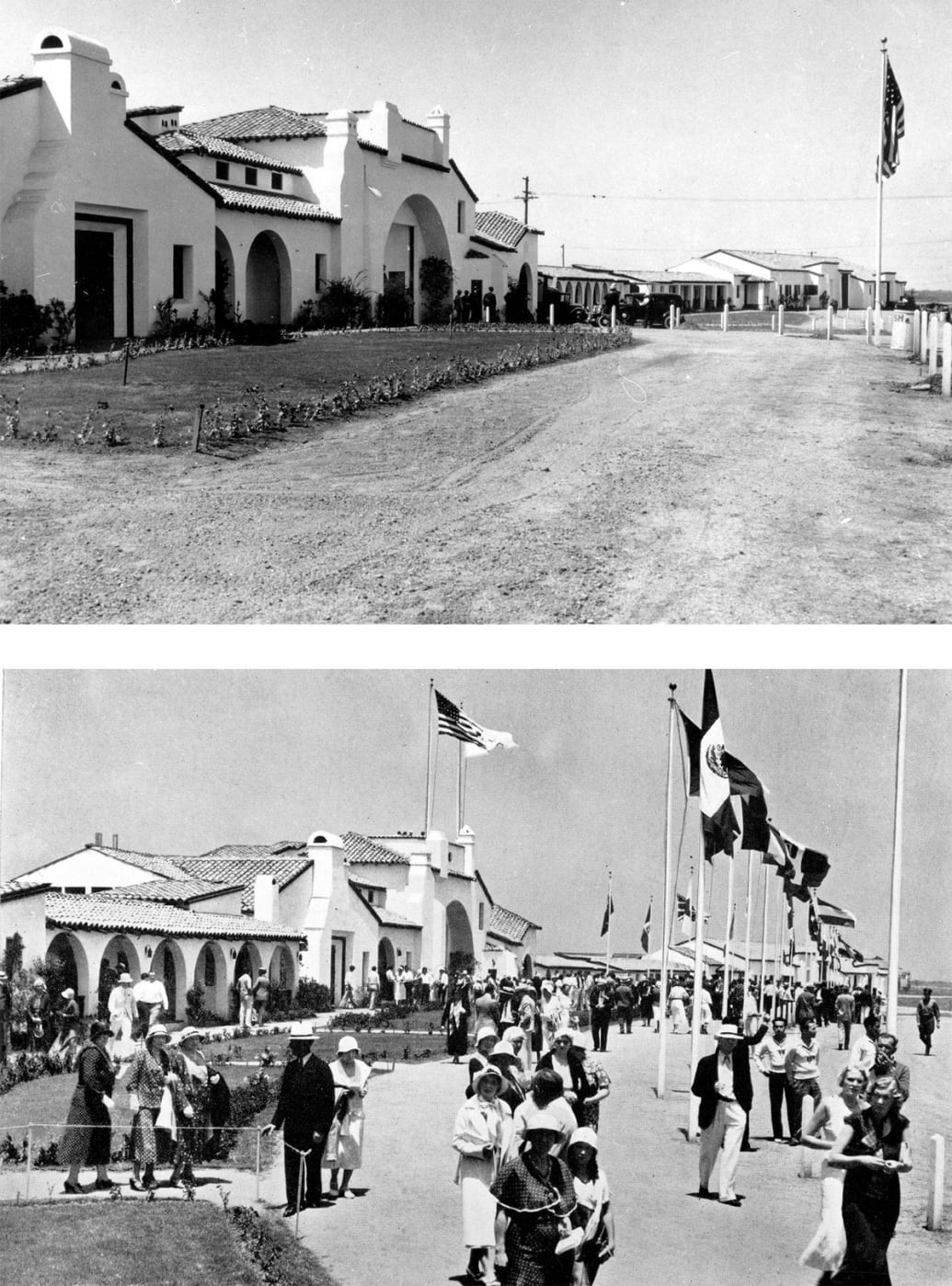
In an almost surreal way, those experiencing the Olympic gala were dwelling in a parallel universe, sealed off from a country wracked by angry riots; smoky, damp Hoovervilles; and the Bonus Army band of twenty thousand starving veterans still encamped on the Capitol grounds in ever more desperate conditions. Many of the American athletes in LA were themselves familiar with breadlines: the Olympic Village and Chapman Park Hotel were sumptuous resorts compared to their families’ homes, and the extravagant entertainment provided by LA’s celebrities something close to unimaginable. So too was the camaraderie—the village amounted to an unexpected, if temporary, equalizer in a city where restrictive covenants had long segregated classes and races. For the first time, Billy Garland proudly pointed out, athletes from the poorest nations lived as well at the games as those from wealthy countries. “Ah, it has been lovely,” a Mexican fencer remarked, “we have all been on the same plane.” A New York Times headline read, “Prince and Butcher Live Side by Side: In Strange Olympic Village Class Lines and Distinctions Are Obliterated.”
On July 27, during the very heart of pre–Olympic Games festivities, President Hoover ordered federal troops, under the command of General Douglas MacArthur, to disperse ten thousand destitute men in the Bonus Army camps, who five days before had defied an order to evacuate. The next morning, evictions began in a scattering of the smaller camps and continued all through a sweltering hot day, marked by street fighting between veterans and the police and the death of a thirty-seven-year-old protestor, William Hushka. The tanks started arriving in the late afternoon, accompanied by saber-waving cavalry and five hundred infantry with revolvers drawn. That evening, at 9:22 p.m., some fifteen hundred federal troops led by General MacArthur (and supported by Dwight D. Eisenhower and George S. Patton) encircled the Bonus Army’s main camp in the Anacostia neighborhood of Washington, DC, positioned their tanks, and began to attack with tear gas, torches and bayonets, scattering and fighting the protestors in hand-to-hand combat before setting fire to their tents. At midnight, tear gas filled the air and flames soared over Anacostia as desolate veterans, hauling boxes and suitcases, walked aimlessly away from their makeshift home. The newsreel images were devastating, but in the White House, which stood under tight guard, President Hoover announced with satisfaction that the riotous challenge to government authority had been “met swiftly and firmly.” Those driven out of the camps were not veterans, he maintained, but rather “Communists and persons with criminal records.”
On the same day that Hoover ordered this assault, more than one hundred of the Olympic women athletes were honored at a star-filled luncheon hosted by Will Rogers at the Fox Hills studios, located in what is now Century City. Introduced to the diving star Georgia Coleman, Rogers (with his smile, wink and wad of gum) asked, “What’s your racket?” She replied, “I’m wet.” Babe Didrikson offered to meet Rogers at golf, tennis, horseback riding, boxing, wrestling or any other sport he chose. “Not me,” Rogers said. “I’ve heard about you and you’re too tough. I’ll take somebody easier.”
At 10 a.m. the next morning, the day of the Bonus Army assault, in the observation room of the new city hall tower, Los Angeles extended its official welcome to members of the International Olympic Committee, including the IOC president, Count de Baillet-Latour. Billy had chosen the location wisely, with full intent: The glass-enclosed room, near the top of the city’s tallest structure, offered a stunning view of the many Olympic sites, stretching from mountain to sea. Flags and flowers filled the chamber, an orchestra played, speeches reverberated. Billy glowed.
Early the following morning, July 29, the day after the Bonus Army assault, Vice President Charles Curtis stopped briefly in Las Vegas on the last leg of his train ride to Los Angeles. Anticipating a demonstration connected to the Bonus Army confrontation, authorities there had surrounded the railroad station with mounted machine guns and a platoon of special police with gas grenades. The vice president, still traveling alone but for one secret service man, nonetheless chose to address the crowd. Hecklers interrupted him: “Why didn’t you feed some of those ex-soldiers?” a man cried out. Curtis pounded the rail of the train’s observation platform in response, yelling back, “I’ve fed more than you, you dirty coward. Come up here and talk like that. I have worked for the bonus during President Coolidge’s administration.” Police quickly swarmed the demonstrators and arrested six suspected leaders.
At 8:30 that morning, Curtis arrived at LA’s Central Station, where he was greeted by Billy Garland, Louis B. Mayer, Mayor John Porter and a cheering throng of citizens. A parade followed, carrying the vice president through jammed, noisy streets to his quarters at the Biltmore Hotel. Later that day, he attended the dedication of the new State Building in downtown LA’s Civic Center, where—after being accorded a seventeen-gun salute by a howitzer detachment of National Guard troops—he awarded the Distinguished Flying Cross to Amelia Earhart, in town for the Olympics. Accepting, she said, “I feel as though I’m an old story to California. I can say only one thing: I started my flying career in California—and I am proud of it.”

That evening, Vice President Curtis and IOC president Count de Baillet-Latour were the honored guests at the LA Olympic Organizing Committee’s highly exclusive ceremonial dinner in the ballroom of the Biltmore Hotel, followed by the grand reception and ball for two thousand leading citizens in the hotel’s Sala de Oro. Among the half dozen speeches delivered at the banquet, Billy Garland’s stood out: “There comes frequently to every man times in his life when he experiences genuine contentment and happiness. I feel, for me, that one of those moments is at hand. To have had a part in bringing together this distinguished body of men and women gathered here from every land, fills me with supreme joy. To reflect that we are gathered here on the eve of a great world event, the effects of which will be felt by generations to come, causes one to meditate on the solemnity of the occasion.”
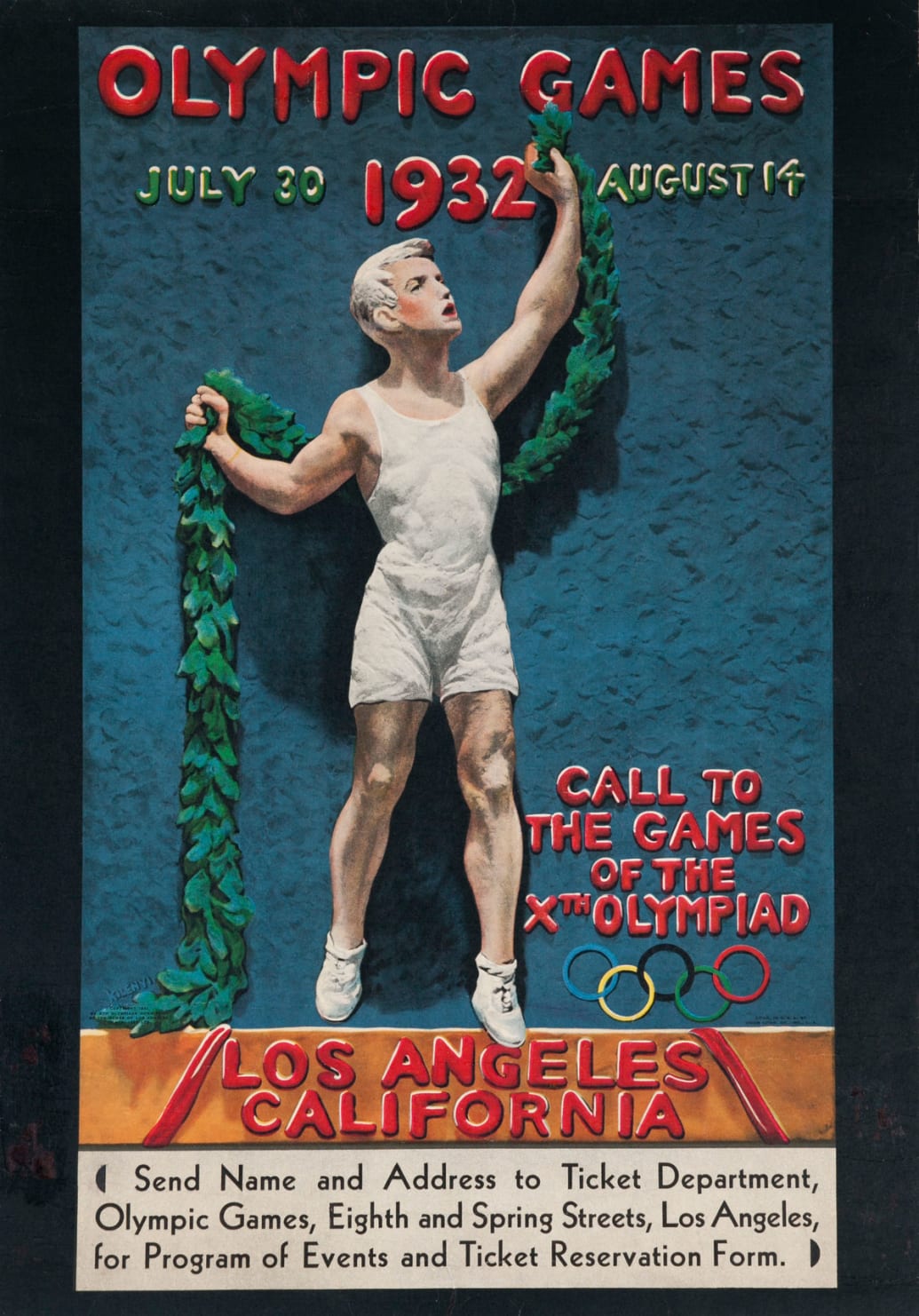
Savory food followed for a crowd that by then must have been hungry: California melon and alligator pear supreme, clear green turtle soup, brook trout sauté Doria, breast of chicken with Virginia ham and fresh mushrooms, new asparagus polonaise, potatoes Parisienne, salad Los Angeles, bombe Olympic, and petits fours, capped off with coffee, cigars and cigarettes. Billy, wearing white tie and a broad smile, personally escorted Charles Curtis and Count de Baillet-Latour from the banquet to the reception, even as federal troops in Washington, with one final gas and fire attack, swept through the Bonus Army encampment, mopping up and ousting the last protestors.
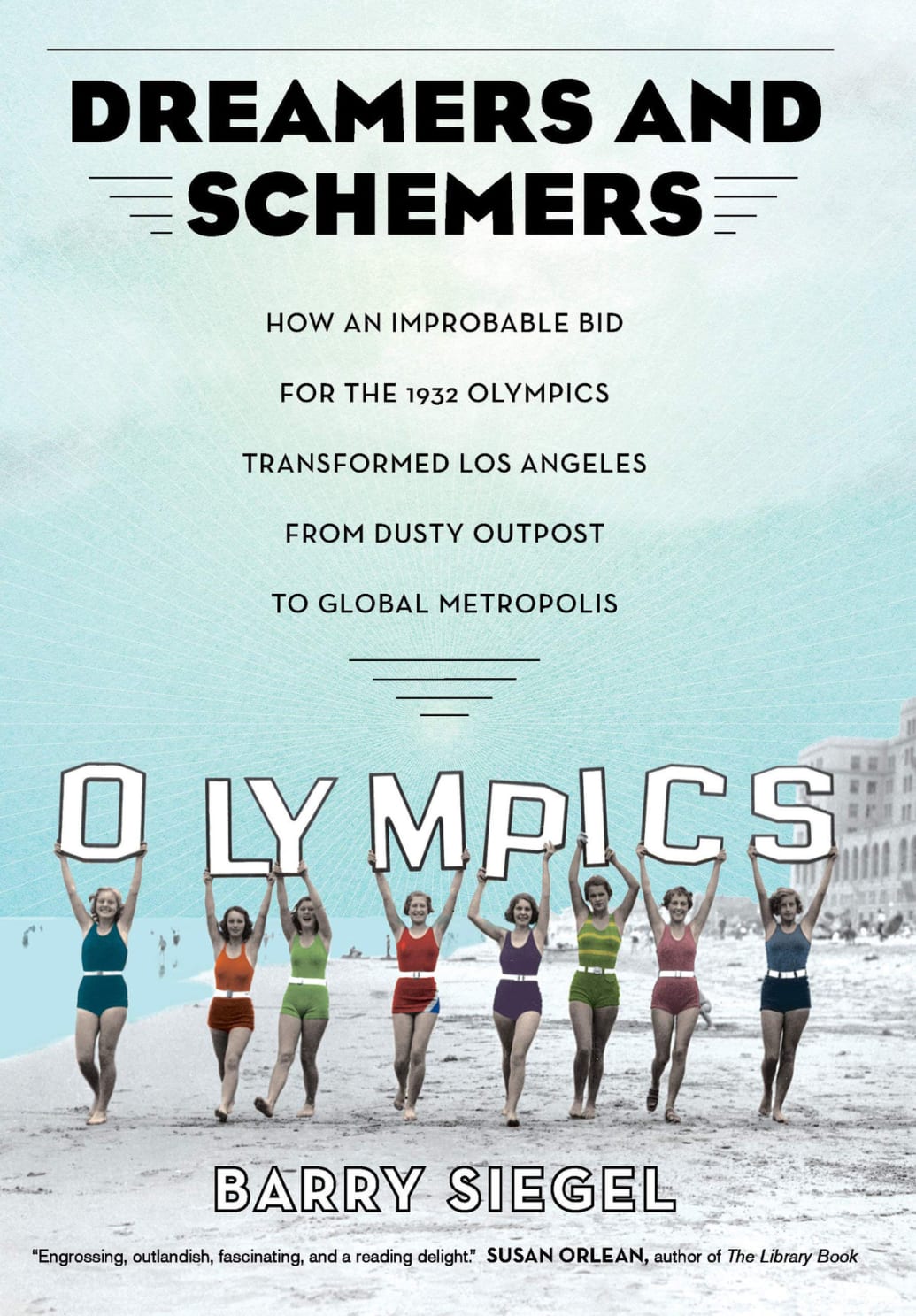
Excerpted from Dreamers and Schemers: How an Improbable Bid for the 1932 Olympics Transformed Los Angeles from Dusty Outpost to Global Metropolis by Barry Siegel. Courtesy of University of California Press.
